- Home
- Ian Fleming
Bond 01 - Casino Royale Page 2
Bond 01 - Casino Royale Read online
Page 2
Fate rebuked him with terrifying swiftness.
Barely three months later, on the 13th April, there was passed in France Law No. 46685 entitled Loi Tendant à la Fermeture des Maisons de Tolérance et au Renforcement de la Lutte contre le Proxénitisme.
(When M. came to this sentence he grunted and pressed a switch on the intercom.
‘Head of S.?’
‘Sir.’
‘What the hell does this word mean?’ He spelt it out.
‘Pimping, sir.’
‘This is not the Berlitz School of Languages, Head of S. If you want to show off your knowledge of foreign jaw-breakers, be good enough to provide a crib. Better still, write in English.’
‘Sorry, sir.’
M. released the switch and turned back to the memorandum.)
This law (he read), known popularly as ‘La Loi Marthe Richard’, closing all houses of ill-fame and forbidding the sale of pornographic books and films, knocked the bottom out of his investment almost overnight and suddenly Le Chiffre was faced with a serious deficit in his union funds. In desperation he turned his open houses into ‘maisons de passe’ where clandestine rendezvous could be arranged on the border-line of the law, and he continued to operate one or two ‘cinemas bleus’ underground, but these shifts in no way served to cover his overheads, and all attempts to sell his investment, even at a heavy loss, failed dismally. Meanwhile the Police des Moeurs were on his trail and in a short while twenty or more of his establishments were closed down.
The police were, of course, only interested in this man as a big-time brothel-keeper and it was not until we expressed an interest in his finances that the Deuxième Bureau unearthed the parallel dossier which was running with their colleagues of the police department.
The significance of the situation became apparent to us and to our French friends and, in the past few months, a veritable rat-hunt has been operated by the police after the establishments of the Cordon Jaune, with the result that today nothing remains of Le Chiffre’s original investment and any routine inquiry would reveal a deficit of around fifty million francs in the trade union funds of which he is the treasurer and paymaster.
It does not seem that the suspicions of Leningrad have been aroused yet but, unfortunately for Le Chiffre, it is possible that at any rate SMERSH is on the scent. Last week a high-grade source of Station P. reported that a senior official of this efficient organ of Soviet vengeance had left Warsaw for Strasbourg via the Eastern sector of Berlin. There is no confirmation of this report from the Deuxième Bureau, nor from the authorities in Strasbourg (who are reliable and thorough) and there is also no news from Le Chiffre’s headquarters there, which we have well covered by a double agent (in addition to 1860).
If Le Chiffre knew that SMERSH was on his tail or that they had the smallest suspicion of him, he would have no alternative but to commit suicide or attempt to escape, but his present plans suggest that while he is certainly desperate, he does not yet realize that his life may be at stake. It is these rather spectacular plans of his that have suggested to us a counter-operation which, though risky and unconventional, we submit at the end of this memorandum with confidence.
In brief, Le Chiffre plans, we believe, to follow the example of most other desperate till-robbers and make good the deficit in his accounts by gambling. The ‘Bourse’ is too slow. So are the various illicit traffics in drugs, or rare medicines, such as aureo- and streptomycin and cortisone. No race tracks could carry the sort of stakes he will have to play and, if he won, he would more likely be killed than paid off.
In any case, we know that he has withdrawn the final twenty-five million francs from the treasury of his union and that he has taken a small villa in the neighbourhood of Royale-les-Eaux, just north of Dieppe, for a week from a fortnight tomorrow.
Now, it is expected that the Casino at Royale will see the highest gambling in Europe this summer. In an effort to wrest the big money from Deauville and Le Touquet, the Société des Bains de Mers de Royale have leased the baccarat and the two top chemin-de-fer tables to the Mahomet Ali Syndicate, a group of emigré Egyptian bankers and business-men with, it is said, a call on certain royal funds, who have for years been trying to cut in on the profits of Zographos and his Greek associates resulting from their monopoly of the highest French baccarat banks.
With the help of discreet publicity, a considerable number of the biggest operators in America and Europe have been encouraged to book at Royale this summer and it seems possible that this old-fashioned watering-place will regain some of its Victorian renown.
Be that as it may, it is here that Le Chiffre will, we are confident, endeavour on or after 15 June to make a profit at baccarat of fifty million francs on a working capital of twenty-five million. (And, incidentally, save his life.)
Proposed Counter-operation
It would be greatly in the interests of this country and of the other nations of the North Atlantic Treaty Organization that this powerful Soviet agent should be ridiculed and destroyed, that his communist trade union should be bankrupted and brought into disrepute, and that this potential fifth column, with a strength of 50,000, capable in time of war of controlling a wide sector of France’s northern frontier, should lose faith and cohesion. All this would result if Le Chiffre could be defeated at the tables. (N.B. Assassination is pointless. Leningrad would quickly cover up his defalcations and make him into a martyr.)
We therefore recommend that the finest gambler available to the Service should be given the necessary funds and endeavour to out-gamble this man.
The risks are obvious and the possible loss to the Secret funds is high, but other operations on which large sums have been hazarded have had fewer chances of success, often for a smaller objective.
If the decision is unfavourable, the only alternative would be to place our information and our recommendations in the hands of the Deuxième Bureau or of our American colleagues of the Combined Intelligence Agency in Washington. Both of these organizations would doubtless be delighted to take over the scheme.
Signed: S.
Appendix A.
Name: Le Chiffre.
Aliases: Variations on the words ‘cypher’ or ‘number’ in different languages; e.g. ‘Herr Ziffer’.
Origin: Unknown.
First encountered as a displaced person, inmate of Dachau D.P. camp in the U.S. Zone of Germany, June 1945. Apparently suffering from amnesia and paralysis of vocal cords (? both feigned). Dumbness succumbed to therapy, but subject continued to claim total loss of memory except associations with Alsace Lorraine and Strasbourg whither he was transferred in September 1945, on Stateless Passport No. 304-596. Adopted the name ‘Le Chiffre’ (‘since I am only a number on a passport’). No Christian names.
Age: About 45.
Description: Height 5 ft. 8 in. Weight 18 stone. Complexion very pale. Clean-shaven. Hair red-brown, ‘en brosse’. Eyes very dark brown with whites showing all round iris. Small, rather feminine mouth. False teeth of expensive quality. Ears small, with large lobes, indicating some Jewish blood. Hands small, well-tended, hirsute. Feet small. Racially, subject is probably a mixture of Mediterranean with Prussian or Polish strains. Dresses well and meticulously, generally in dark double-breasted suits. Smokes incessantly Caporals, using a denicotinizing holder. At frequent intervals inhales from benzedrine inhaler. Voice soft and even. Bilingual in French and English. Good German. Traces of Marseillais accent. Smiles infrequently. Does not laugh.
Habits: Mostly expensive, but discreet. Large sexual appetites. Flagellant. Expert driver of fast cars. Adept with small arms and other forms of personal combat, including knives. Carries three Eversharp razor blades, in hat-band, heel of left shoe and cigarette case. Knowledge of accountancy and mathematics. Fine gambler. Always accompanied by two armed guards, well-dressed, one French, one German (details available).
Comment: A formidable and dangerous agent of the U.S.S.R., controlled by Leningrad Section III through Paris.
Signed: Archivist.
Appendix B.
Subject: SMERSH
Sources: Own archives and scanty material made available by Deuxième Bureau and C.I.A. Washington.
SMERSH is a conjunction of two Russian words: ‘Smyert Shpionam’, meaning roughly: ‘Death to Spies’. Ranks above M.W.D. (formerly N.K.V.D.) and is believed to come under the personal direction of Beria.
Headquarters: Leningrad (sub-station at Moscow).
Its task is the elimination of all forms of treachery and back-sliding within the various branches of the Soviet Secret Service and Secret Police at home and abroad. It is the most powerful and feared organization in the U.S.S.R. and is popularly believed never to have failed in a mission of vengeance.
It is thought that SMERSH was responsible for the assassination of Trotsky in Mexico (22 August 1940) and may indeed have made its name with this successful murder after attempts by other Russian individuals and organizations had failed.
SMERSH was next heard of when Hitler attacked Russia. It was then rapidly expanded to cope with treachery and double agents during the retreat of the Soviet forces in 1941. At that time it worked as an execution squad for the N.K.V.D. and its present selective mission was not so clearly defined.
The organization itself was thoroughly purged after the war and is now believed to consist of only a few hundred operatives of very high quality divided into five sections:
Department I: In charge of counter-intelligence among Soviet organizations at home and abroad.
Department II: Operations, including executions.
Department III: Administration and Finance.
Department IV: Investigations and legal work. Personnel.
Department V: Prosecutions: the section which passes final judgement on all victims.
Only one SMERSH operative has come into our hands since the war: Goytchev, alias Garrad-Jones. He shot Petchora, medical officer at the Yugoslav Embassy, in Hyde Park, 7 August 1948. During interrogation he committed suicide by swallowing a coat-button of compressed potassium cyanide. He revealed nothing beyond his membership of SMERSH, of which he was arrogantly boastful.
We believe that the following British double agents were victims of SMERSH: Donovan, Harthrop-Vane, Elizabeth Dumont, Ventnor, Mace, Savarin. (For details see Morgue: Section Q.)
Conclusion: Every effort should be made to improve our knowledge of this very powerful organization and destroy its operatives.
3 ....... NUMBER 007
HEAD OF S. (the section of the Secret Service concerned with the Soviet Union) was so keen on his plan for the destruction of Le Chiffre, and it was basically his own plan, that he took the memorandum himself and went up to the top floor of the gloomy building overlooking Regent’s Park and through the green baize door and along the corridor to the end room.
He walked belligerently up to M.’s Chief of Staff, a young sapper who had earned his spurs as one of the secretariat to the Chiefs of Staff committee after having been wounded during a sabotage operation in 1944, and had kept his sense of humour in spite of both experiences.
‘Now look here, Bill. I want to sell something to the Chief. Is this a good moment?’
‘What do you think, Penny?’ The Chief of Staff turned to M.’s private secretary who shared the room with him.
Miss Moneypenny would have been desirable but for eyes which were cool and direct and quizzical.
‘Should be all right. He won a bit of a victory at the F.O. this morning and he’s not got anyone for the next half an hour.’ She smiled encouragingly at Head of S. whom she liked for himself and for the importance of his section.
‘Well, here’s the dope, Bill.’ He handed over the black folder with the red star which stood for Top Secret. ‘And for God’s sake look enthusiastic when you give it him. And tell him I’ll wait here and read a good code-book while he’s considering it. He may want some more details, and anyway I want to see you two don’t pester him with anything else until he’s finished.’
‘All right, sir.’ The Chief of Staff pressed a switch and leant towards the intercom on his desk.
‘Yes?’ asked a quiet, flat voice.
‘Head of S. has an urgent docket for you, sir.’
There was a pause.
‘Bring it in,’ said the voice.
The Chief of Staff released the switch and stood up.
‘Thanks, Bill. I’ll be next door,’ said Head of S.
The Chief of Staff crossed his office and went through the double doors leading into M.’s room. In a moment he came out and over the entrance a small blue light burned the warning that M. was not to be disturbed.
Later, a triumphant Head of S. said to his Number Two: ‘We nearly cooked ourselves with that last paragraph. He said it was subversion and blackmail. He got pretty sharp about it. Anyway, he approves. Says the idea’s crazy, but worth trying if the Treasury will play and he thinks they will. He’s going to tell them it’s a better gamble than the money we’re putting into deserting Russian colonels who turn double after a few months’ “asylum” here. And he’s longing to get at Le Chiffre, and anyway he’s got the right man and wants to try him out on the job.’
‘Who is it?’ asked Number Two.
‘One of the Double Os – I guess 007. He’s tough and M. thinks there may be trouble with those gunmen of Le Chiffre’s. He must be pretty good with the cards or he wouldn’t have sat in the Casino in Monte Carlo for two months before the war watching that Roumanian team work their stuff with the invisible ink and the dark glasses. He and the Deuxième bowled them out in the end and 007 turned in a million francs he had won at shemmy. Good money in those days.’
James Bond’s interview with M. had been short.
‘What about it, Bond?’ asked M. when Bond came back into his room after reading Head of S.’s memorandum and after gazing for ten minutes out of the waiting-room window at the distant trees in the park.
Bond looked across the desk into the shrewd, clear eyes.
‘It’s very kind of you, sir, I’d like to do it. But I can’t promise to win. The odds at baccarat are the best after ‘trente-et-quarante’ – evens except for the tiny ‘cagnotte’ – but I might get a bad run against me and get cleaned out. Play’s going to be pretty high – opening’ll go up to half a million, I should think.’
Bond was stopped by the cold eyes. M. knew all this already, knew the odds at baccarat as well as Bond. That was his job – knowing the odds at everything, and knowing men, his own and the opposition’s. Bond wished he had kept quiet about his misgivings.
‘He can have a bad run too,’ said M. ‘You’ll have plenty of capital. Up to twenty-five million, the same as him. We’ll start you on ten and send you another ten when you’ve had a look round. You can make the extra five yourself.’ He smiled. ‘Go over a few days before the big game starts and get your hand in. Have a talk to Q. about rooms and trains, and any equipment you want. The Paymaster will fix the funds. I’m going to ask the Deuxième to stand by. It’s their territory and as it is we shall be lucky if they don’t kick up rough. I’ll try and persuade them to send Mathis. You seemed to get on well with him in Monte Carlo on that other Casino job. And I’m going to tell Washington because of the N.A.T.O. angle. C.I.A. have got one or two good men at Fontainebleau with the joint intelligence chaps there. Anything else?’
Bond shook his head. ‘I’d certainly like to have Mathis, sir.’
‘Well, we’ll see. Try and bring it off. We’re going to look pretty foolish if you don’t. And watch out. This sounds an amusing job, but I don’t think it’s going to be. Le Chiffre is a good man. Well, best of luck.’
‘Thank you, sir,’ said Bond and went to the door.
‘Just a minute.’
Bond turned. ‘I think I’ll keep you covered, Bond. Two heads are better than one and you’ll need someone to run your communications. I’ll think it over. They’ll get in touch with you at Royale. You needn’t worry. It’ll be someone good.’
&n
bsp; Bond would have preferred to work alone, but one didn’t argue with M. He left the room hoping that the man they sent would be loyal to him and neither stupid, nor, worse still, ambitious.
4 ....... ‘L’ENNEMI ÉCOUTE’
AS, TWO weeks later, James Bond awoke in his room at the Hotel Splendide, some of this history passed through his mind.
He had arrived at Royale-les-Eaux in time for luncheon two days before. There had been no attempt to contact him and there had been no flicker of curiosity when he had signed the register ‘James Bond, Port Maria, Jamaica’.
M. had expressed no interest in his cover.
‘Once you start to make a set at Le Chiffre at the tables, you’ll have had it,’ he said. ‘But wear a cover that will stick with the general public.’
Bond knew Jamaica well, so he asked to be controlled from there and to pass as a Jamaican plantocrat whose father had made his pile in tobacco and sugar and whose son chose to play it away on the stock markets and in casinos. If inquiries were made, he would quote Charles DaSilva of Caffery’s, Kingston, as his attorney. Charles would make the story stick.
Bond had spent the last two afternoons and most of the nights at the Casino, playing complicated progression systems on the even chances at roulette. He made a high banco at chemin-de-fer whenever he heard one offered. If he lost, he would ‘suivi’ once and not chase it further if he lost the second time.
In this way he had made some three million francs and had given his nerves and card-sense a thorough work-out. He had got the geography of the Casino clear in his mind. Above all, he had been able to observe Le Chiffre at the tables and to note ruefully that he was a faultless and lucky gambler.
Bond liked to make a good breakfast. After a cold shower, he sat at the writing-table in front of the window. He looked out at the beautiful day and consumed half a pint of iced orange juice, three scrambled eggs and bacon and a double portion of coffee without sugar. He lit his first cigarette, a Balkan and Turkish mixture made for him by Morlands of Grosvenor Street, and watched the small waves lick the long seashore and the fishing fleet from Dieppe string out towards the June heat-haze followed by a paper-chase of herring-gulls.

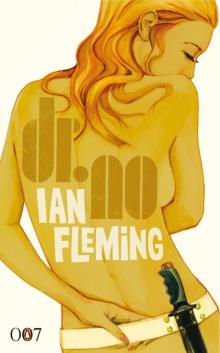 Doctor No
Doctor No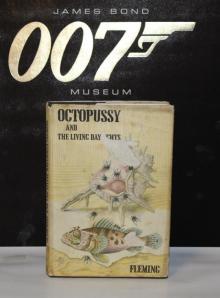 Octopussy & the Living Daylights
Octopussy & the Living Daylights On Her Majestys Secret Service
On Her Majestys Secret Service You Only Live Twice
You Only Live Twice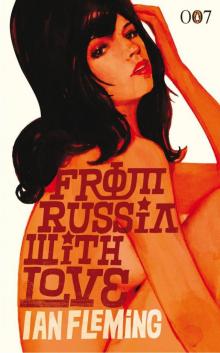 From Russia With Love
From Russia With Love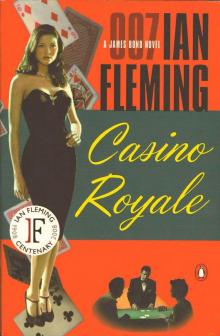 Casino Royale
Casino Royale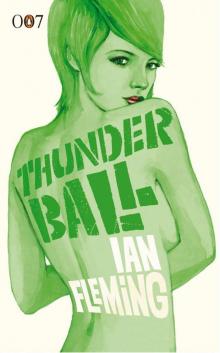 Thunderball
Thunderball For Your Eyes Only
For Your Eyes Only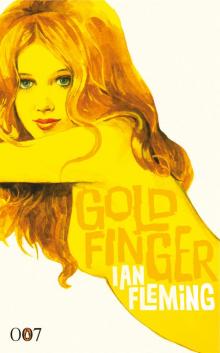 Goldfinger
Goldfinger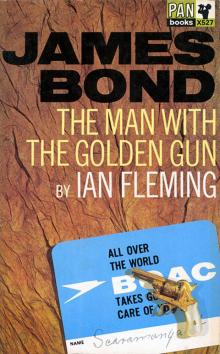 The Man With the Golden Gun
The Man With the Golden Gun The Spy Who Loved Me
The Spy Who Loved Me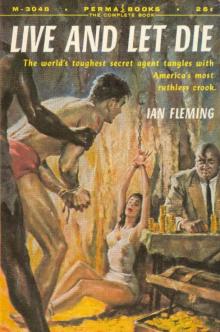 Live and Let Die
Live and Let Die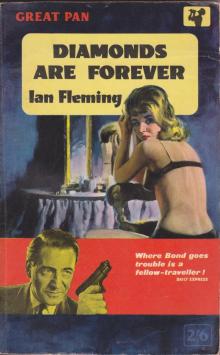 Diamonds Are Forever
Diamonds Are Forever Moonraker
Moonraker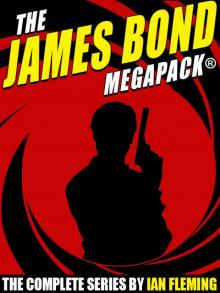 The James Bond MEGAPACK®
The James Bond MEGAPACK®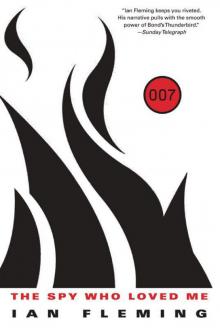 Bond 10 - The Spy Who Loved Me
Bond 10 - The Spy Who Loved Me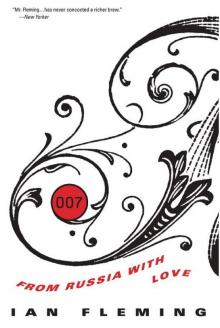 From Russia with Love (James Bond - Extended Series Book 5)
From Russia with Love (James Bond - Extended Series Book 5)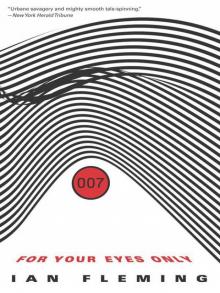 Bond 08 - For Your Eyes Only
Bond 08 - For Your Eyes Only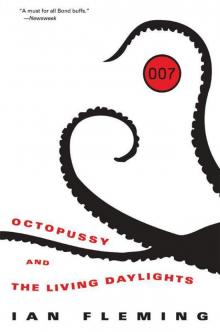 Bond 14 - Octopussy and the Living Daylights
Bond 14 - Octopussy and the Living Daylights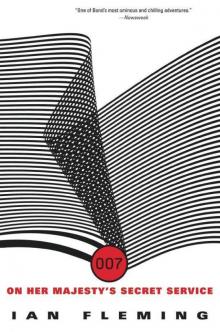 Bond 11 - On Her Majesty's Secret Service
Bond 11 - On Her Majesty's Secret Service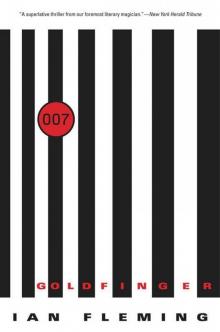 Bond 07 - Goldfinger
Bond 07 - Goldfinger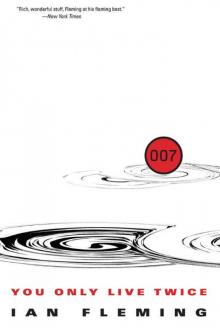 Bond 12 - You Only Live Twice
Bond 12 - You Only Live Twice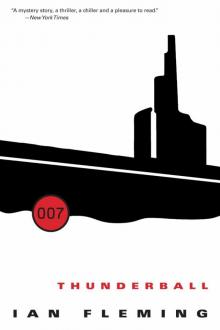 Bond 09 - Thunderball
Bond 09 - Thunderball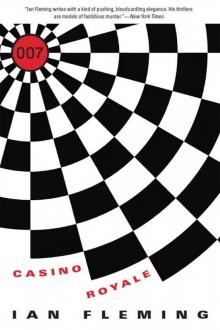 Bond 01 - Casino Royale
Bond 01 - Casino Royale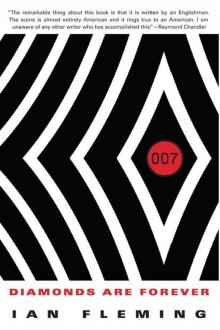 Diamonds are Forever (James Bond - Extended Series Book 4)
Diamonds are Forever (James Bond - Extended Series Book 4)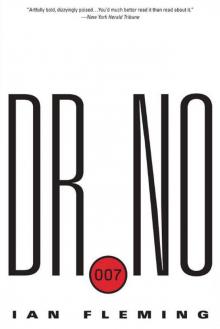 Bond 06 - Dr. No
Bond 06 - Dr. No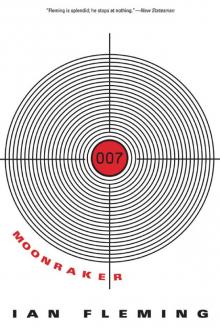 Moonraker (James Bond - Extended Series Book 3)
Moonraker (James Bond - Extended Series Book 3)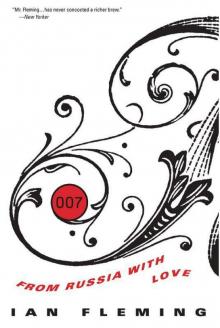 Bond 05 - From Russia With Love
Bond 05 - From Russia With Love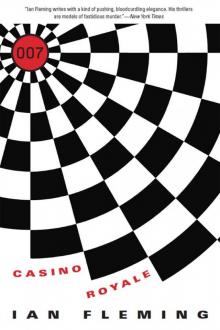 Casino Royale (James Bond - Extended Series Book 1)
Casino Royale (James Bond - Extended Series Book 1)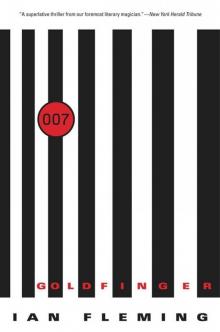 Goldfinger (James Bond - Extended Series Book 7)
Goldfinger (James Bond - Extended Series Book 7) Chitty Chitty Bang Bang: The Magical Car
Chitty Chitty Bang Bang: The Magical Car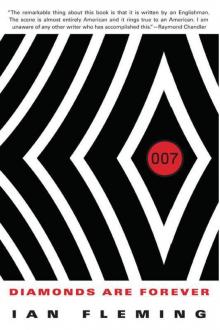 Bond 04 - Diamonds Are Forever
Bond 04 - Diamonds Are Forever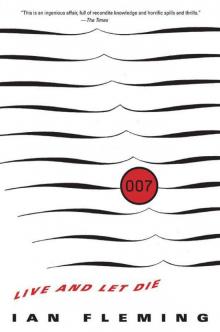 Bond 02 - Live and Let Die
Bond 02 - Live and Let Die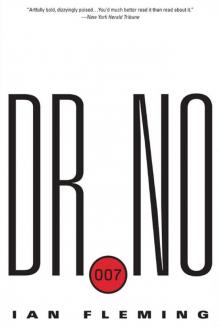 Dr. No (James Bond - Extended Series Book 6)
Dr. No (James Bond - Extended Series Book 6) The Hildebrandt rarity
The Hildebrandt rarity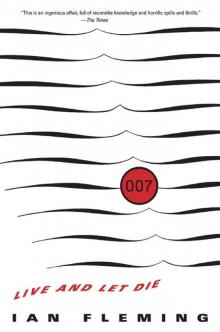 Live and Let Die (James Bond - Extended Series Book 2)
Live and Let Die (James Bond - Extended Series Book 2) Chitty Chitty Bang Bang
Chitty Chitty Bang Bang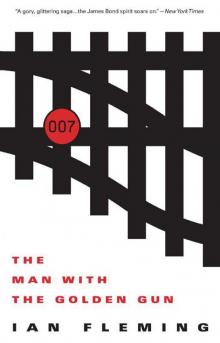 Bond 13 - The Man With the Golden Gun
Bond 13 - The Man With the Golden Gun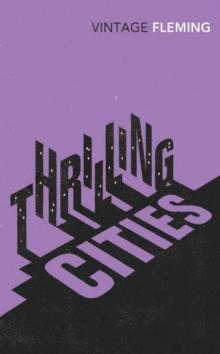 Thrilling Cities
Thrilling Cities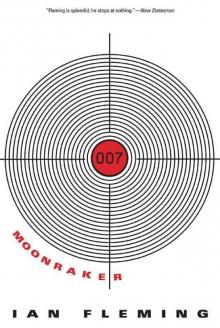 Bond 03 - Moonraker
Bond 03 - Moonraker